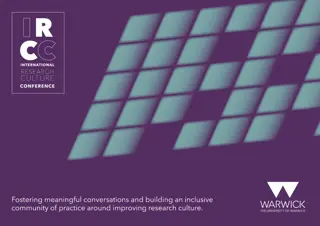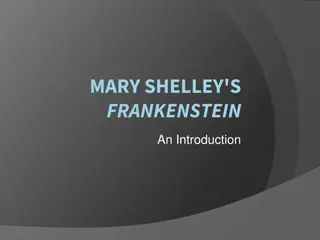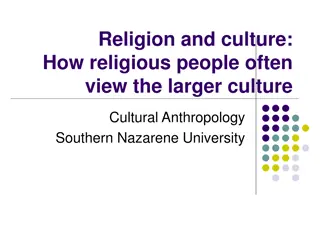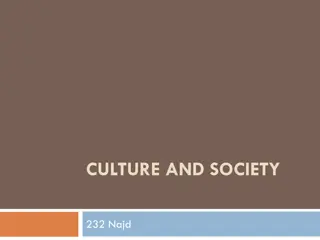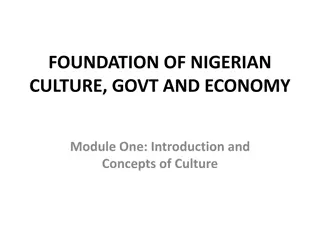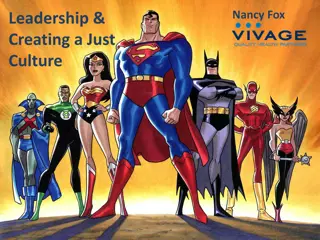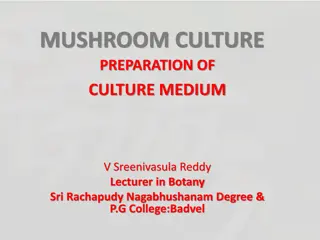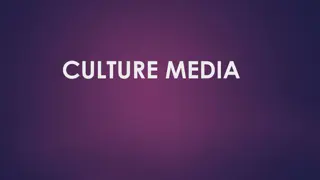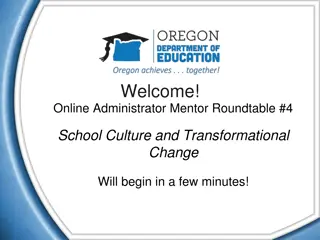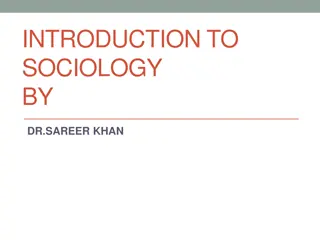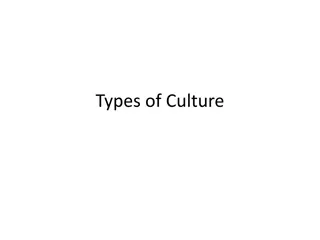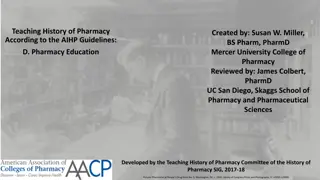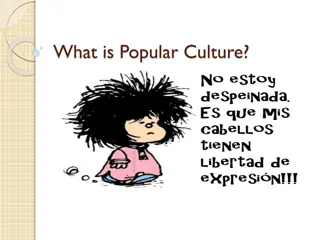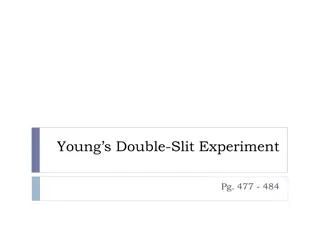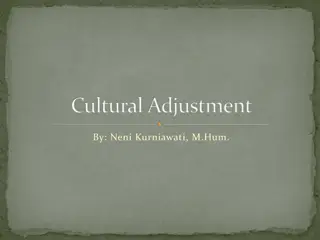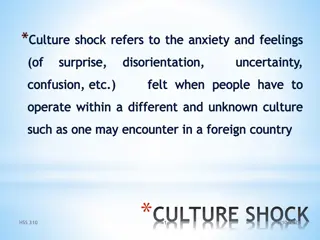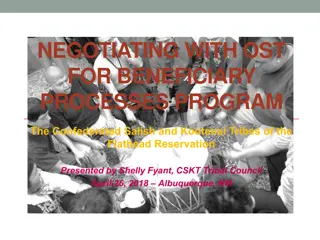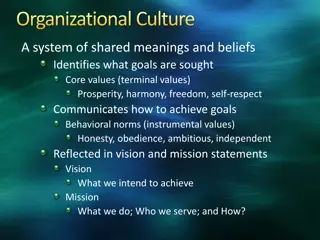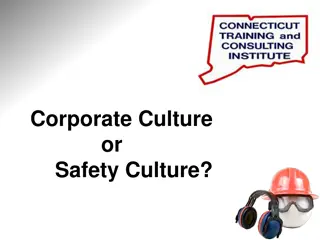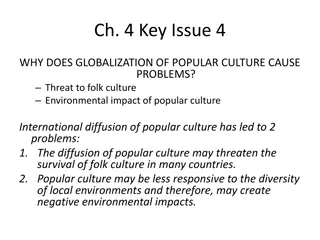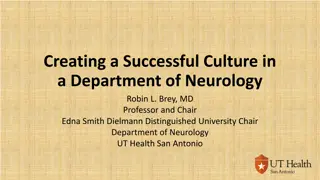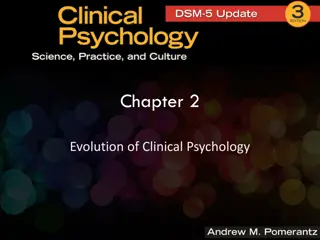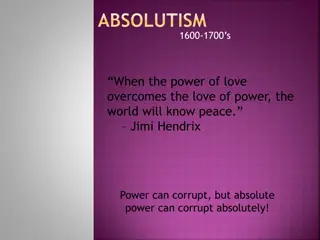IRCC International Research Culture Conference 2023: Empowering Global Communities
Explore the transformative potential of co-production in research and enterprise culture at the IRCC International Research Culture Conference 2023 hosted by Heriot-Watt University. Join Professor Jemina Napier, Dr. Fiona Armstrong, and Catalina Bastidas to delve into developing a purposeful global
10 views • 10 slides
Understanding Organizational Culture and Generational Myths in the Workplace
Explore the impact of organizational culture on employee engagement, the aspects shaping workplace culture, and the debunking of generational myths in the modern workforce. Discover how leadership can create a cohesive culture that benefits employees of all generations.
1 views • 39 slides
Coffee and Orientalism: Exploring the Relationship in the 1700s
Delve into the intriguing history of coffee and its role in shaping the relationship between Europe and the Ottoman Empire around 1700. Learn about the perceived virtues of coffee, the various types in circulation, and the significance of these differences. Images and quotations offer a vivid insigh
1 views • 7 slides
Enhancing University of Warwick's Research Culture through Work Experience Programs and Staff Development
This project aims to address social mobility issues in STEM by developing a research culture at the University of Warwick. Through internal funding sources, the project focuses on enhancing work experience programs and enabling staff development to support the wider university community. Key activit
3 views • 12 slides
Mary Shelley's Frankenstein: An Intriguing Introduction
Mary Shelley, born in 1797 to writers William Godwin and Mary Wollstonecraft, had a tumultuous life that greatly influenced her masterpiece, Frankenstein. Her novel, framed within a frame story by Robert Walton, explores themes of ambition, creation, and the consequences of playing god. The settings
4 views • 14 slides
Perspectives on the Relationship Between Religion and Culture
Religious people often perceive the larger culture in different ways, as illustrated by Richard Niebuhr's classic positions in "Christ and Culture" and Charles Kraft's later perspectives on God's role in culture. These viewpoints range from rejecting cultural influence to integrating Christianity an
1 views • 14 slides
Understanding Organisational Culture and Placement Etiquette
Explore the significance of organisational culture and placement etiquette in the context of thriving in a placement. Understand the impact of aligning personal values with company culture for a fulfilling career. Discover tips on assessing organisational culture during interviews to make informed d
0 views • 7 slides
Understanding Culture and Society
Culture and society are interconnected concepts, where culture encompasses beliefs, behaviors, and objects shared within a community, shaping their identity and values. Society, on the other hand, comprises individuals interacting based on common cultural bonds, whether ethnic, gender-based, or thro
0 views • 12 slides
Cultivating an Effective Data Culture: Strategies and Insights
Explore the key elements of developing a data-informed culture through national guidance, research insights, and practical considerations. Learn about creating a safe space for collaboration, effective data systems and processes, and the impact of a positive culture on teaching and learning. Gain va
1 views • 24 slides
Understanding Nigerian Culture, Government, and Economy: Module One
Delve into Module One of the course on Nigerian culture, government, and economy with a focus on the Introduction and Concepts of Culture. Explore definitions of culture, various types of culture, characteristics, importance, related concepts, levels, and differences between culture and ethnic group
1 views • 31 slides
Understanding Just Culture in Leadership: Creating a Fair and Error-Preventive Environment
Punitive culture in institutions can lead to mistakes being hidden, affecting error prevention. Dr. Lucian Leape highlights the importance of avoiding punishment for errors, advocating for a Just Culture model. This model, coined by David Marx, recognizes human error and helps differentiate between
0 views • 24 slides
Mushroom Culture: Preparation of Culture Medium and Edible Mushroom Examples
Mushroom culture involves the preparation of culture medium for cultivating various edible mushrooms. This process includes the systematic classification, structure, and examples of edible mushrooms. The medium preparation methods and materials are essential for successful mushroom cultivation. The
0 views • 24 slides
Culture Media
Culture media play a crucial role in isolating bacteria from clinical specimens. Water, electrolytes, peptone, agar, meat extract, yeast extract, and blood/serum are essential constituents used in culture media. These components provide nutrients, solidifying agents, and growth factors necessary for
1 views • 26 slides
Understanding Plant Tissue Culture: Methods and Requirements
Plant tissue culture involves the in-vitro culture of plant explants under aseptic conditions, covering cell, organ, and suspension cultures. This process, pioneered by German botanist Gottlieb Haberlandt, relies on the totipotency of plant cells. Key requirements include laboratory organization, su
0 views • 18 slides
Leading to Safety
Examining the crucial link between organizational culture and safety programs, this content emphasizes the importance of fostering a culture of safety within organizations to ensure the success of safety initiatives. It explores the process of changing organizational culture, starting from defining
0 views • 20 slides
School Culture and Transformational Change Roundtable
Explore the importance of school culture and transformational change in an online roundtable setting. Participants will discuss current roles, prior knowledge, objectives, and guiding questions related to reshaping school culture. Learn about the impact of positive school culture on staff, students,
0 views • 25 slides
Understanding Culture in Sociology: Key Concepts and Definitions
Culture is the cornerstone of society, distinguishing humans from animals and shaping our social lives. Sociologists define culture as the shared values, practices, norms, and beliefs that govern our interactions and behaviors. This comprehensive guide explores the non-material aspects of culture, i
1 views • 30 slides
Understanding Plant Tissue Culture Media and Their Importance in In Vitro Growth
Plant tissue culture media play a crucial role in the in vitro growth and morphogenesis of plant tissues. The composition of culture media depends on the specific plant species and the type of material used for culture. Various types of media, such as White's medium, MS medium, B5 medium, N6 medium,
0 views • 6 slides
Overview of Cell Culture Methods and Importance in Research
Introduction to the principles of cell culture, including tissue culture, organ culture, and cell culture methods. Discusses the advantages and disadvantages of each technique and highlights the need for cell culture in research for studying cellular behavior and large-scale production of cell mater
3 views • 45 slides
Understanding Popular Culture: Classification and Impact
General classification of culture includes Popular, High/Elite, Low/Subculture, Primary & Secondary, Folk, and Co-Culture. Popular culture, shaped by mass media, encompasses ideas, attitudes, and phenomena favored by society. It influences daily life, with examples like styles of dress, slang, and s
0 views • 16 slides
Evolution of Pharmacy Education in Early U.S. History
Pharmacy education in early U.S. history evolved from an apprenticeship model in the 1700s, transitioning to independent colleges of pharmacy by the early 19th century. Originally considered an art, pharmacy education adapted to incorporate scientific principles and standardized practices, reflectin
0 views • 29 slides
Perspectives on Youth Culture Through Functionalist and Neo-Marxist Views
Functionalist and Neo-Marxist perspectives on youth culture offer contrasting views on its purpose in society. Functionalist theorists emphasize the role of youth culture in providing a transitional phase for young people, aiding in their social integration and development of independence. On the ot
0 views • 11 slides
Understanding Popular Culture and Ideology
Popular culture encompasses the lived practices and artistic products of society, contrasting with high culture. Various definitions highlight its appeal to a wide audience and its distinction from high culture. The relationship between popular culture and ideology is explored through practices that
0 views • 15 slides
Understanding Young's Double-Slit Experiment and Interference Patterns
Thomas Young's double-slit experiment in the late 1700s provided evidence of light behaving as a wave, showcasing interference patterns. This experiment challenged the particle theory of light and supported the wave theory. The interference patterns observed helped scientists grasp the wave nature o
0 views • 27 slides
Exploring Early American Civilizations and European Impact
Discover the Columbian Exchange, Early American Civilizations like Aztec, Inca, and Maya, Inca civilization characteristics, European Exploration impact on Native Americans, and motives for European Expansionism. Learn about technologies aiding European exploration and the economic concept of mercan
0 views • 26 slides
Understanding Cultural Adjustment: Navigating Different Ways of Life
Cultural adjustment involves experiencing culture shock when encountering a new way of life due to immigration, travel, or a shift in social environments. This process includes symptoms like excessive concern, fear of physical contact, and refusal to learn the host country's language. Overcoming cul
0 views • 12 slides
Understanding Culture Shock: Phases, Symptoms, and Coping Strategies
Culture shock is the anxiety and disorientation experienced when adapting to a new and unfamiliar culture. This phenomenon involves various stages, from the honeymoon phase to readjustment and reverse culture shock. Symptoms of culture shock can be physiologically, psychologically, and socially base
1 views • 11 slides
Proposed NRC Safety Culture Policy Statement Overview
This document provides an overview of the proposed Nuclear Regulatory Commission (NRC) Safety Culture Policy Statement presented by Eric Fries, the Safety Culture Program Manager. It covers topics such as NRC's mission, responsibility, safety culture background, draft policy statement, current statu
0 views • 24 slides
Choose Your Own Adventure: Medical Marketplace in 1700s England
You, a 25-year-old woman in 1700s England, seek treatment for persistent head pain. You face a choice between a formal practitioner or an informal one. Opting for a formal practitioner leads you to an apothecary advertising a cure-all elixir. After ingesting the medicine, you have a severe reaction
0 views • 22 slides
Plant Tissue Culture Methods for Growth and Reproduction Study
Plant tissue culture methods such as root tip culture, shoot-tip culture, leaf culture, flower culture, and anther and pollen culture allow for the study of growth, reproduction, and genetic variations in plants. These techniques involve culturing various plant parts under sterile conditions to inve
1 views • 20 slides
Negotiating with OST for Beneficiary Processes Program by CSKT Tribal Council
The Confederated Salish and Kootenai Tribes of the Flathead Reservation have a rich historical background stemming from the late 1700s, leading to the present self-governance initiatives. The past, defined by treaties and allotment acts, influences the tribe's future endeavors, including negotiating
0 views • 10 slides
Understanding Organizational Culture and Its Impact on Business Success
Organizational culture encompasses shared beliefs, values, and behaviors within a company. It influences goal-setting, strategies, and employee actions. The transmission of culture is vital for aligning values with business practices. Culture matters for client relations, differentiation, and managi
0 views • 17 slides
Understanding Corporate Culture vs. Safety Culture in Organizations
Explore the dynamics of corporate culture and safety culture within organizations through a series of images and quotes. Learn about aligning goals, promoting a culture of safety, and the crucial factors that contribute to a safe workplace environment. Delve into the responsibilities of management,
0 views • 38 slides
Nationalist Revolutions in Latin America: 1789-1900
Rising nationalism in Latin America during the late 1700s and early 1800s led to revolutions against European colonial powers. Inspired by Enlightenment ideals and events such as the American and French Revolutions, Latin Americans sought self-government and independence. The Haitian Revolution in 1
1 views • 28 slides
Certificate Courses in Indian Cultural Studies by Department of Vedic Sciences & Indian Culture
Explore month-long certificate courses in Indian Cultural Studies offered by the Department of Vedic Sciences & Indian Culture in collaboration with Sri Aurobindo Foundation for Indian Culture. Delve into India's rich cultural heritage to gain insights into ancient wisdom traditions, prepare for con
0 views • 8 slides
Challenges of Globalization in Popular Culture
Globalization of popular culture presents challenges such as the threat to folk culture and negative environmental impacts. Rising incomes lead to a shift from folk to popular culture, affecting traditional values and clothing symbolism. The adoption of Western clothing in Middle Eastern countries f
0 views • 12 slides
Tracing Ancestry: A DNA Success Story of the Meeker Family
Autosomal DNA success story tracing ancestors born in the 1700s, focusing on the Meeker family. Uncovering the ancestry of Levi Perry's wife, Elizabeth, through genealogical data analysis and census records. The search for Elizabeth's father between two Meeker brothers, Grove and Forrest Meeker, bas
0 views • 29 slides
Cultivating a Successful Culture in Neurology Department
Importance of culture in a neurology department highlighted by Dr. Robin L. Brey. Emphasis on how culture trumps strategy and the role of leaders in maintaining a positive culture. Examples and insights on how culture influences decision-making and behavior. Attributes of a successful culture and ho
0 views • 21 slides
Evolution of Clinical Psychology: Early Pioneers and the Creation of Clinical Practice
The evolution of clinical psychology is traced from the 1700s to the early 20th century, highlighting key figures such as William Tuke, Philippe Pinel, Eli Todd, and Dorothea Dix who advocated for humane treatment of the mentally ill. Lightner Witmer's establishment of the first psychological clinic
0 views • 24 slides
Rise and Fall of Absolutism: A Glimpse into 17th-Century Monarchy
Explore the era of Absolutism (1600-1700s) where rulers wielded absolute power, influenced by divine right beliefs. Focusing on Louis XIV of France, known as the Sun King, who shaped France's destiny through extravagant projects like the Palace of Versailles. However, challenges to absolute rule eme
0 views • 17 slides



